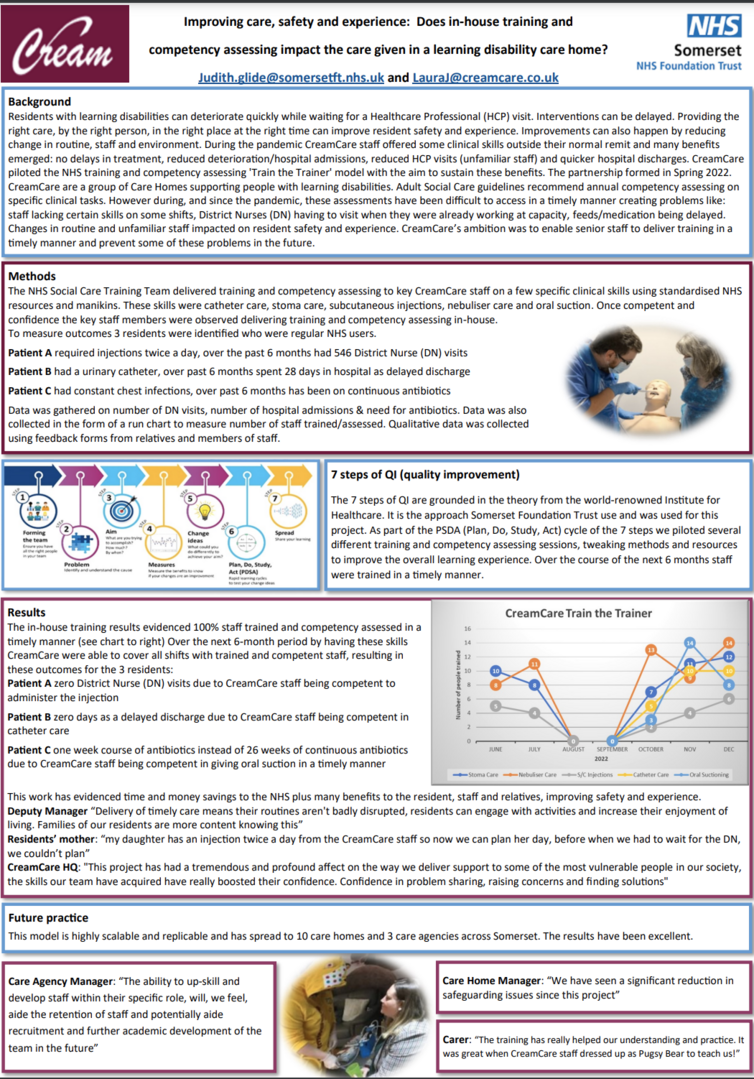Background:
Residents with learning disabilities can deteriorate quickly while waiting for a Healthcare Professional (HCP) visit. Interventions can be delayed. Providing the right care, by the right person, in the right place at the right time can improve resident safety and experience. Improvements for residents can also happen by reducing change in routine, staff and environment. During the pandemic CreamCare staff offered some clinical skills outside their normal remit and many benefits emerged: no delays in treatment, reduced deterioration/hospital admissions, reduced HCP visits (unfamiliar staff) and quicker hospital discharges. CreamCare collaborated with us to pilot our training and competency assessing 'Train the Trainer' model with the aim to sustain these benefits.
Methods:
The Social Care Training Team delivered training and competency assessing to key CreamCare staff on a few specific clinical skills using standardised NHS resources and manikins. These skills were catheter care, stoma care, subcutaneous injections, nebuliser care and oral suction. Once competent and confidence, the key staff members were observed delivering training and competency assessing in-house.
To measure outcomes 3 residents were identified who were regular NHS users.
Patient A required injections twice a day, over the past 6 months had 546 District Nurse (DN) visits
Patient B had a urinary catheter, over past 6 months spent 28 days in hospital as delayed discharge
Patient C had constant chest infections, over past 6 months has been on continuous antibiotics
Data was gathered on number of DN visits, number of hospital admissions & need for antibiotics & collected in the form of a run chart. Qualitative data was collected using feedback forms from relatives and members of staff.
Results:
The in-house TTT training results evidenced 100% staff trained and competency assessed in a timely manner
Over the next 6-month period by having these skills CreamCare staff were able to cover all shifts with trained and competent staff, resulting in these outcomes for the 3 residents:
Patient A zero District Nurse (DN) visits due to CreamCare staff being competent to administer the injection
Patient B zero days as a delayed discharge due to CreamCare staff being competent in catheter care
Patient C one week course of antibiotics instead of 26 weeks of continuous antibiotics due to CreamCare staff being competent in giving oral suction in a timely manner.
This work has evidenced time and money savings to the NHS plus many benefits to the resident, staff and relatives, improving safety and experience.
Deputy Manager “Delivery of timely care means their routines aren't badly disrupted, residents can engage with activities and increase their enjoyment of living. Families of our residents are more content knowing this”
Residents’ mother: “my daughter has an injection twice a day from the CreamCare staff so now we can plan her day, before when we had to wait for the DN, we couldn’t plan”
CreamCare HQ: "This project has had a tremendous and profound effect on the way we deliver support to some of the most vulnerable people in our society, the skills our team have acquired have really boosted their confidence. Confidence in problem sharing, raising concerns and finding solutions"
Care Home Manager: “We have seen a significant reduction in safeguarding issues since this project”
Care Agency Manager: “The ability to up-skill and develop staff within their specific role, will, we feel, aide the retention of staff and potentially aide recruitment and further academic development of the team in the future”
Carer: “The training has really helped our understanding and practice.
Future practice:
This model is highly scalable and replicable and has spread to 10 care homes and 3 care agencies across Somerset.
The results have been excellent and we have been nominated as finalists for the 2023 HSJ Patient Safety Awards.
Click on the image below to read and download the project poster


